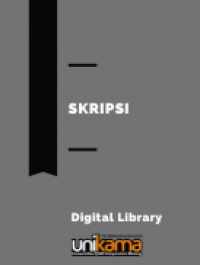
Electronic Resource
Improving Students’ Vocabulary By Using Jigsaw Method In The Fifth Grade Students Of SDN Tlogowaru I
People in the world need communication with each other to create the interaction and purposes. Language takes important roles to deliver good communication become fluently and run well. English is a kind of language that is used as international part of the education beginning on kindergarten until
university.
The implementing method about vocabulary for elementary school is not easy. Thus, we must prepare everything. Teaching simple English to elementary school requires patience, because the student able memories just seven or eight new words at a time.
This Classroom Action Research at SDN Tlogowaru 1. The researcher chooses the fifth grades of SDN Tlogowaru 1 because during the researcher teaches English in this class, the researcher found some problems in students’ vocabulary mastery. This research is located at Kedung Kandang street Malang. The research use observation, action through, check list , questionaire an vocabulary test.
The research will conduct four meeting Implementation the method. The first meeting the research will conduct observation consist of interview, questionaire as quantitatif data and post – test as qualitatif data to know the students problems and way to solve the problems. The second and the third meeting the researcher will apply jigsaw method. The last meeting the researcher will conduct post- test to measure the effect of Jigaw method to increase vocabulary ability standart criteria of succes. If 80% of students get 70 scores.
This research will success if the result of sudents’ score do not reach criteria of succes, the researcher will conduct to the next cycle.
Based on the result of this study, the researcher found that jigsaw method can improve the students’ ability in vocabulary mastery. The students can solve their difficulties in learning English especially in vocabulary mastery. The researcher conclude that the research was succes.
Ketersediaan
| 2118761/SB/2015 | KKI 420 MAR i/s | Perpustakaan Unikama | Tersedia |
Informasi Detail
- Judul Seri
-
-
- No. Panggil
-
KKI 420 MAR i/s
- Penerbit
- Malang : Pendidikan Bahasa Inggris-Unikama., 2014
- Deskripsi Fisik
-
xi, 42 hlm
- Bahasa
-
English
- ISBN/ISSN
-
-
- Klasifikasi
-
420
- Tipe Isi
-
text
- Tipe Media
-
PDF
- Tipe Pembawa
-
-
- Edisi
-
-
- Subjek
- Info Detail Spesifik
-
-
- Pernyataan Tanggungjawab
-
-
Versi lain/terkait
Tidak tersedia versi lain
Lampiran Berkas
Komentar
Anda harus masuk sebelum memberikan komentar
 Karya Umum
Karya Umum  Filsafat
Filsafat  Agama
Agama  Ilmu-ilmu Sosial
Ilmu-ilmu Sosial  Bahasa
Bahasa  Ilmu-ilmu Murni
Ilmu-ilmu Murni  Ilmu-ilmu Terapan
Ilmu-ilmu Terapan  Kesenian, Hiburan, dan Olahraga
Kesenian, Hiburan, dan Olahraga  Kesusastraan
Kesusastraan  Geografi dan Sejarah
Geografi dan Sejarah